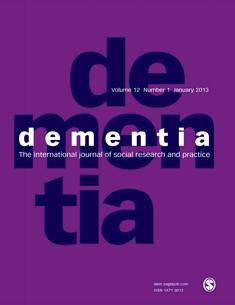
Dementia-International Journal of Social Research and Practice
Scope & Guideline
Transforming understanding through interdisciplinary insights.
Introduction
Aims and Scopes
- Interdisciplinary Research on Dementia Experiences:
The journal publishes studies that explore the lived experiences of individuals with dementia, including their emotional, social, and psychological challenges, as well as the dynamics between them and their caregivers. - Innovative Care Practices:
Research that investigates new methodologies and interventions in dementia care, including the use of technology, arts-based activities, and community engagement to enhance the quality of life for people living with dementia. - Cultural and Ethnic Considerations:
A focus on the experiences of diverse populations and the impact of cultural contexts on dementia care, ensuring that research reflects the needs of various ethnic and cultural groups. - Policy and Practice Implications:
The journal emphasizes studies that bridge research with policy, aiming to inform best practices in dementia care and influence healthcare policies at local, national, and international levels. - Caregiver Perspectives and Support:
Research highlighting the experiences, challenges, and needs of caregivers, including strategies for support and interventions designed to alleviate caregiver burden. - Community Engagement and Social Inclusion:
Investigating the role of community initiatives and support systems in promoting social inclusion and well-being for individuals living with dementia, with a focus on collaborative approaches.
Trending and Emerging
- Technology-Enhanced Care Solutions:
An increase in research exploring the integration of technology in dementia care, including telehealth, mobile applications, and digital tools for enhancing communication and engagement. - Person-Centered and Tailored Interventions:
A growing emphasis on personalized care approaches that cater to the unique needs and preferences of individuals with dementia and their caregivers. - Cultural Competence in Dementia Care:
Emerging themes focus on culturally tailored interventions and the importance of understanding diverse cultural perspectives in dementia care practices. - Mental Health and Well-Being of Caregivers:
Research is increasingly addressing the mental health challenges faced by caregivers, with studies focusing on support strategies and interventions to promote caregiver well-being. - Community-Based Participatory Research:
There is a trend towards community engagement in research, with participatory approaches that involve individuals living with dementia and caregivers in the research process. - Interdisciplinary Collaboration:
The journal is seeing more studies that reflect interdisciplinary approaches, combining insights from healthcare, social sciences, and the arts to enhance dementia care and support.
Declining or Waning
- Traditional Medical Models of Dementia:
There is a noticeable decline in studies that approach dementia solely from a biomedical perspective, favoring instead more holistic and person-centered approaches that consider the psychological and social aspects of living with dementia. - Stigmatization of Dementia:
Research specifically targeting stigma associated with dementia has become less frequent, as the focus has shifted towards empowerment and inclusion strategies that promote understanding and reduce discrimination. - Institutional Care Models:
Papers focusing exclusively on traditional institutional care settings for dementia have decreased, reflecting a broader trend towards community-based care models and individualized support. - Quantitative Assessments without Qualitative Insights:
There seems to be a reduction in purely quantitative studies that do not incorporate qualitative insights, as the journal increasingly values nuanced understandings of dementia experiences. - General Awareness Campaigns:
While awareness of dementia remains important, specific studies on generic awareness campaigns are less frequent, with more emphasis being placed on targeted, culturally sensitive interventions.
Similar Journals

Journal of Alzheimers Disease Reports
Transforming Understanding of DementiaJournal of Alzheimer's Disease Reports, published by IOS PRESS, is an essential open-access platform dedicated to advancing research in the fields of clinical psychology, geriatrics, gerontology, neuroscience, and psychiatry. Since its inception in 2017, this journal has rapidly gained recognition, achieving a commendable status reflected in its 2023 category quartiles, notably ranking Q2 in Clinical Psychology and Psychiatry and Mental Health. With a sustained commitment to disseminating high-quality research and facilitating collaboration among scientists, the journal offers insights into the critical aspects of Alzheimer's disease and related cognitive disorders. Given its positions in the Scopus ranks, it serves as a crucial resource for academics and practitioners alike, empowering them to contribute effectively to the ongoing discourse in cognitive health. The journal embraces open access, ensuring that all research findings are freely available to the global community, thereby enhancing visibility and engagement. With a focus on fostering innovation and knowledge transfer, Journal of Alzheimer's Disease Reports is poised to make an enduring impact in the field of dementia research.
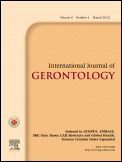
International Journal of Gerontology
Transforming gerontological research into impactful practices.International Journal of Gerontology is a distinguished peer-reviewed journal dedicated to advancing the field of gerontology and addressing the multifaceted challenges associated with aging. Published by the Taiwan Society of Geriatric Emergency & Critical Care Medicine, this innovative journal has been an open-access platform since 2018, ensuring that vital research is accessible to a global audience. With an ISSN of 1873-9598, it serves as a crucial resource for researchers and practitioners focused on the biological, psychological, and social aspects of aging. The journal is indexed in Scopus with a rank of #103/116 in the Medicine category (Geriatrics and Gerontology) as of 2023, placing it in the Q4 quartile—a testament to its evolving impact in the field. Spanning works published from 2007 to 2024, the International Journal of Gerontology facilitates the dissemination of critical research findings and clinical practices that inform and enhance geriatric care and research methodologies.

Generations
Exploring the Complexities of Aging TogetherGenerations, published by the American Society on Aging, serves as a vital interdisciplinary platform for scholars and practitioners within the field of aging and gerontology. With its ISSN of 0738-7806 and E-ISSN of 2694-5126, this journal has been a valuable resource since its inception in 1985, connecting research and practice across converging years and advancing discussions surrounding the complexities of aging and lifespan studies. Although classified in the Q4 quartile for categories such as Geriatrics and Gerontology, Life-span and Life-course Studies, and Public Health, its contributions are increasingly relevant in a rapidly aging society. The journal’s emphasis on critical issues surrounding aging makes it essential reading for health professionals, policy makers, and researchers dedicated to enhancing the quality of life for older adults. As it continues its publication journey up to 2024, Generations remains committed to fostering scholarly discourse and offering innovative insights in this crucial area of study.
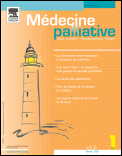
Medecine Palliative
Transforming Pain Management Through Research.Medecine Palliative is a distinguished journal published by Elsevier, dedicated to the vital field of palliative care and pain management. With an ISSN of 1636-6522 and E-ISSN 2213-0098, this international journal has been an essential resource since its inception in 1970, currently covering research from 2004 to 2024. The journal reflects a commitment to enhancing the quality of life for patients facing serious illnesses, addressing critical issues in Anesthesiology and Oncology, while fostering innovative nursing practices in palliative care. While the journal holds a Q3 ranking in Anesthesiology and Pain Medicine and a Q4 in Oncology categories, making it a valuable venue for researchers and practitioners aiming to contribute to the evolving landscape of palliative medicine. Despite its lower rank in some categories, the journal serves as an important platform for insights, clinical findings, and current practices that can significantly impact patient care. Medecine Palliative is accessible to researchers, professionals, and students who are eager to explore the latest advancements and evidence-based approaches in end-of-life care.

CHILD WELFARE
Exploring Evidence-Based Practices for Child ProtectionCHILD WELFARE is a prominent journal dedicated to advancing research and practice in the field of child welfare, published by the Child Welfare League of America Inc.. Established in 1971, this journal has been a vital resource for professionals, researchers, and policymakers interested in child welfare issues, with a robust impact reflected in its Scopus ranking of #264 out of 915 in the General Medicine category, indicating a strong standing in the field. While it operates under a traditional subscription model, the journal emphasizes the dissemination of evidence-based research and innovative practices that directly inform effective child welfare systems. Despite its discontinued coverage in Scopus after 2015, CHILD WELFARE remains relevant by addressing critical topics such as policy reform, child protection, foster care, and community interventions. As a critical voice in the field, the journal strengthens the understanding and improvement of child welfare practices across various settings, ensuring that the well-being of children remains a priority.
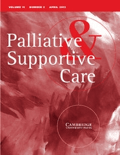
Palliative & Supportive Care
Fostering Interdisciplinary Dialogue for Patient Well-beingPalliative & Supportive Care, published by Cambridge University Press, is a pivotal journal dedicated to advancing research and practice in the fields of palliative care, supportive care, and the psychological aspects of terminal and chronic illness. With a robust ISSN of 1478-9515 and an E-ISSN of 1478-9523, this esteemed journal has established itself as a vital resource for professionals, researchers, and students who are committed to improving the quality of life for patients facing serious health challenges. Featuring peer-reviewed articles that span clinical psychology, medicine, nursing, and psychiatry, it holds a respectable impact factor, ranking Q2 in Clinical Psychology, Medicine, and Nursing as per the 2023 category quartiles. The journal is based in the United Kingdom and has been contributing to the field since its inception in 2003. Although it currently does not offer Open Access, its rigorously curated content underscores its relevance and importance in facilitating interdisciplinary dialogue and innovation in palliative and supportive care. For those seeking to stay at the forefront of research, Palliative & Supportive Care remains an indispensable platform for scholarly communication and discovery.
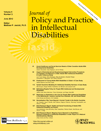
Journal of Policy and Practice in Intellectual Disabilities
Empowering Change Through Insightful ScholarshipJournal of Policy and Practice in Intellectual Disabilities, published by WILEY, stands as a prominent platform dedicated to advancing our understanding and application of policies and practices that affect individuals with intellectual disabilities. Established in 2009, this esteemed journal addresses critical issues in the field of social sciences, primarily focusing on health and public health, evident from its high rankings in Q1 and Q2 categories in the 2023 metrics. With an ISSN of 1741-1122 and an E-ISSN of 1741-1130, it operates out of the United Kingdom, offering vital insights that inform service delivery, policy-making, and research initiatives surrounding intellectual disabilities. Though not an open access journal, it provides a rich resource for researchers, professionals, and students aiming to contribute to meaningful change in this vital area of social welfare. The journal’s commitment to rigorous scholarship is reflected in its Scopus rankings, highlighting its influence as a pivotal resource for those seeking to enhance and innovate practices that uplift community well-being.
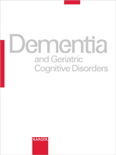
DEMENTIA AND GERIATRIC COGNITIVE DISORDERS
Empowering healthcare through accessible dementia research.DEMENTIA AND GERIATRIC COGNITIVE DISORDERS is a distinguished peer-reviewed journal published by KARGER, based in Switzerland. With a focus on the critical fields of cognitive neuroscience, geriatrics, and psychiatry, this journal is integral to advancing our understanding of cognitive decline and geriatric health. Despite being established from 1990 through 1992 and relaunching its scope in 1994, it has consistently provided a platform for innovative research, as reflected in its strong impact factor and notable Scopus rankings, placing it in the Q2 quartile for disciplines including cognitive neuroscience and geriatric medicine. The journal aims to foster interdisciplinary dialogue and collaboration among researchers, healthcare professionals, and educators, contributing to the growing field of dementia research and elderly care. Open access options further ensure that this vital knowledge is widely accessible, making a significant impact in both academic and clinical settings. With a commitment to quality and relevance, DEMENTIA AND GERIATRIC COGNITIVE DISORDERS remains a key resource for those dedicated to understanding and addressing the challenges posed by cognitive disorders in aging populations.

ALZHEIMER DISEASE & ASSOCIATED DISORDERS
Exploring innovative solutions for Alzheimer’s care and research.ALZHEIMER DISEASE & ASSOCIATED DISORDERS, published by Lippincott Williams & Wilkins, is a pivotal journal for advancing knowledge in the fields of clinical psychology, geriatric medicine, and psychiatry. With a history spanning from 1987 to 2024, this journal provides a comprehensive platform for researchers and clinicians to disseminate significant findings related to Alzheimer's disease and associated cognitive disorders. Ranked within the second and third quartiles in various categories, including clinical psychology and geriatrics, it retains a solid academic reputation, indicated by its diverse Scopus rankings, such as #137 in Clinical Psychology and #20 in Nursing & Gerontology. Although it does not offer open access, the journal is recognized for its commitment to peer-reviewed research, making it a valuable resource for professionals and students alike, aiming to stay abreast of the latest developments and evidence-based practices in Alzheimer’s and associated conditions.

Clinical Gerontologist
Transforming the future of aging and mental health.The Clinical Gerontologist is a premier journal published by Routledge Journals, Taylor & Francis Ltd, that focuses on the interdisciplinary field of gerontology and clinical psychology. With its rich history dating back to 1982 and extending until 2024, this journal serves as a vital resource for researchers, practitioners, and students interested in the complex dynamics of aging and the psychological aspects of care for older adults. Boasting a commendable impact factor and ranking in the top quartiles across multiple categories—including Social Sciences, Geriatrics, and Clinical Psychology—the Clinical Gerontologist demonstrates its commitment to advancing knowledge and best practices within this critical area. Its rigorous peer-reviewed articles address emerging trends, evidence-based practices, and policy implications, making it essential reading for anyone involved in geriatric care and research. While not an open-access journal, it provides access to its diverse range of scholarly articles and research findings, ensuring that critical information reaches those dedicated to enhancing the well-being of the older population.